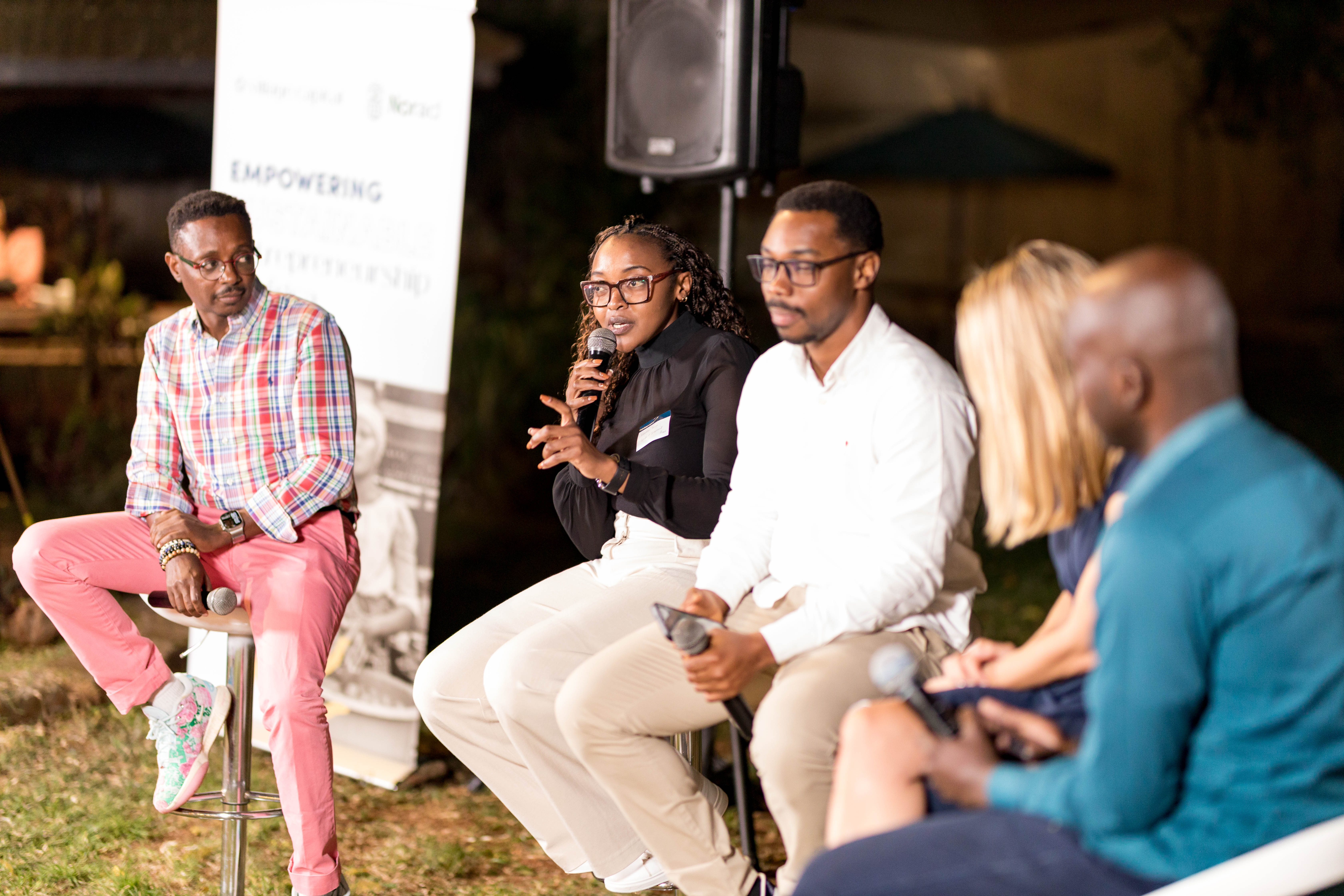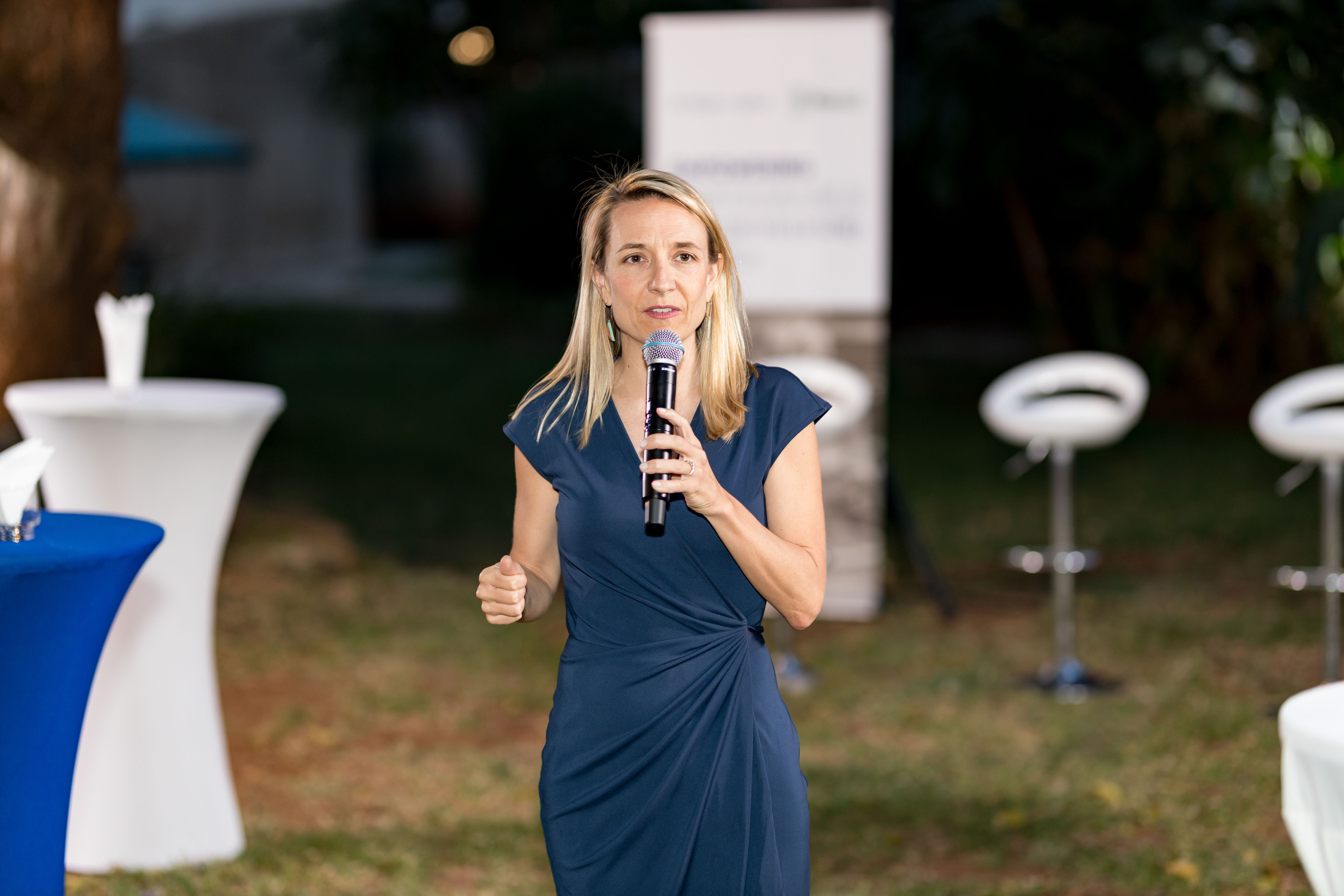
 Village Capital Regional Director for Africa, Nakami Walunywa, speaking during the Advancing Climate Tech in Africa in Nairobi / HANDOUT
Village Capital Regional Director for Africa, Nakami Walunywa, speaking during the Advancing Climate Tech in Africa in Nairobi / HANDOUTAfrica is emerging as a key climate technology hub, with global players recognising the continent’s role in nurturing startups that scale solutions for food security, energy, and sustainability.
Entrepreneur Support Organisations (ESOs) provide infrastructure, mentorship, training, networks, and funding to startups. They form the backbone of Africa’s entrepreneurship ecosystem, helping founders become investment-ready and connect to opportunities.
Entrepreneurs, ESOs, investors, funders, and partners met in Nairobi for the Advancing Climate Tech in Africa forum, a side event to AfricArena’s Nairobi Climate Tech Summit, hosted by Village Capital and Delta40.
Village Capital’s Regional Director for Africa, Nakami Walunywa, stressed the importance of locally led solutions.
“When people think of climate innovation, many picture high-tech labs. But the beating heart of climate innovation is just as likely to be a fish farm in Kisumu, a market hub in Lagos, or a locally led incubator in Dar es Salaam,” Walunywa said.
Village Capital, which has supported more than 1,800 entrepreneurs and 230 ESOs globally, is focusing on both startups and the ESOs that sustain them.
In her speech, Walunywa mentioned Village Capital’s recent investees the platform showcased firms such as Aquarech in Kisumu, which supports small-scale fish farmers, and Coamana in Lagos, which links farmers to markets, as great examples of climate innovations solving local problems.
Locally led ESOs such as EnnovateInnovative Ventures and Reach for Change in Ghana were recognised for creating jobs and advancing climate resilience. Walunywa said ESOs provide critical support that allows young companies to grow. “They help entrepreneurs refine business models, strengthen governance, and connect to markets beyond their immediate communities.
ESOs often run accelerator and incubator programs, offer training, mentorship, and networking opportunities, and prepare startups to become investment-ready,” she said. In the climate tech space, ESOs play an even more vital role, as climate solutions often take longer to prove than in other sectors, requiring years of piloting, customer education, and infrastructure before scaling.
Walunywa said Village Capital works closely with ESOs through programs such as the Empowering Sustainable Entrepreneurship in Africa initiative and the Africa Ecosystem Catalysts Facility. These efforts strengthen locally led organisations to build capacity, deploy capital, and support founders more effectively.
Through the Norad-backed Empowering Sustainable Entrepreneurship in Africa program, Village Capital is supporting 150 climate startups across Ghana, Kenya, Malawi, Mozambique, and Tanzania, while also strengthening ESOs to build capacity, deploy capital, and support founders more effectively. With the recently piloted Africa Ecosystem Catalysts Facility, they leverage a locally led investment model by partnering directly with in-market ESOs. These ESOs help identify strong founder teams and contribute to investment evaluation, ensuring capital is directed where it has the greatest local fit and impact.
The facility shows how locally rooted partners can de-risk investments and unlock more capital for climate solutions. “If investors want to put money to work in early-stage climate tech, the smartest path is to collaborate with ESOs who are already closest to the ground truth,” she said. To ensure climate tech solutions are African-led, Village Capital centres locally led solutions and lived experience.
This means backing founders rooted in their communities, designing with the people most affected by climate change, and building on indigenous knowledge as much as new technology. “This looks like investing through locally led ESOs who know their markets and ensuring African voices shape investment decisions. When entrepreneurs design with lived experience at the core, the solutions are not only more inclusive, they’re more likely to scale because they actually fit the local context.”
According to Walunywa, the future of climate-tech startups in Kenya is promising, with the country positioning itself as a hub for innovation in clean energy, e-mobility, agritech, and circular economy solutions.
“Kenyan startups have recently attracted the majority of climate investment flowing into Africa, thanks to progressive renewable energy policies, mobile payment infrastructure, and a vibrant entrepreneurial culture,” she added.
She noted challenges remain around scaling beyond pilots, policy clarity, and access to patient and purpose-suited local capital.
“Africa doesn’t lack ideas or talent; we lack the support systems to let those ideas thrive.
Climate change is a defining challenge of our time, and Africa has the innovators to meet it head-on. If investors, policymakers, and ESOs come together, not in silos, to back locally led solutions, we won’t just tackle climate challenges, we’ll unlock Africa’s full potential,” Walunywa said.
Kenya is Africa’s Climate Tech Hub
 Panellists at the Advancing Climate Tech in Africa in Nairobi / HANDOUT
Panellists at the Advancing Climate Tech in Africa in Nairobi / HANDOUTAfricArena programme director Dan Mabbyalas said that since 2022, it has run a Kenya-focused initiative under Africarise, targeting climate and green economy ventures.
“For the past five days, since Saturday last week, we have been on the ground. We started with what we call a Founders Bootcamp, a two-day investment-readiness programme for selected startups,” he said.
Startups later pitched to investors and corporates, generating partnerships and funding. One of the biggest success stories is Octavia Carbon, which develops carbon-removal technology.
“When they showcased at Africa Arena in 2023, they were very early. They had about five people in their team. And now, as we speak, they are a startup with about 90 employees.”
The company recently closed a $1 million sales deal and secured investor funding. He said Kenya has consistently topped Africa in startup investment, attracting $800 million in 2023, ahead of Nigeria, South Africa, and Egypt. “For two years in a row, Kenya has been the top,” he said.
“Cuts from major donors such as USAID have hit some startups. Many countries are beginning to restrict funding to their own markets,” he warned, urging founders to focus on strong fundamentals and “really push to become a global player.”
He added that despite funding uncertainties, optimism remains high. One of the panellists, Delta40 Studios Co-founder and Managing Partner Lyndsay Handler, said climate-technology investment in Africa should prioritise livelihoods, jobs, and affordable solutions over simply cutting global emissions.
“What is the climate for Africa? Climate tech globally is about reducing carbon emissions, and I will say that is not, in my view, the main goal of climate investment in Africa. It’s not.”
“Instead, the focus should be on finding the ‘sweet spot’ between immediate economic impact and long-term sustainability.” She said there is a balance between investing in industries in Africa that can create jobs and improve livelihoods today and reduce long-term carbon emissions.
Handler added that African households and businesses need lower-cost energy, which renewable energy can deliver. “Agriculture is another key area where climate action aligns with economic growth. Africa’s crop yields are just a fraction of global averages. African yields are one-seventh of the global yield with known technologies,” she noted.
 Delta 40 Studios Co-Founder and Managing Partner Lyndsay Handler / HANDOUT
Delta 40 Studios Co-Founder and Managing Partner Lyndsay Handler / HANDOUT
Digital tools for farmers
A climate-focused agritech organisation, Amaya, is offering digital solutions designed to make farmers more resilient and profitable.
Amaya President Mabrouk AIB said the startup, currently active in North, West, and Central Africa, has developed mobile applications that support input suppliers and their field teams, including agronomists and sales staff, to deliver tailored, data-driven advice to farmers.
“The idea is to help farmers be more climate resilient and more profitable. Given that it’s difficult for farmers to adopt digital solutions, we work with input suppliers and their teams in the field,” Mabrouk said.
He said the mobile apps integrate satellite imagery, weather data, and agronomic information collected directly in the field. This allows field advisors to plan farm visits, monitor crops, and provide specific recommendations to farmers.
For input suppliers, the tools offer real-time visibility of field operations, helping optimise both sales and technical support.
“At the end of the day, we help advisors support farmers, make better decisions, and monitor crops more efficiently. It’s a huge pain point for input suppliers, and this gives them full visibility of what is happening in the field.”
Mabrouk said the broader vision is to create a shared ecosystem linking farmers, input suppliers, agronomists, banks, and insurers through actionable data.

















